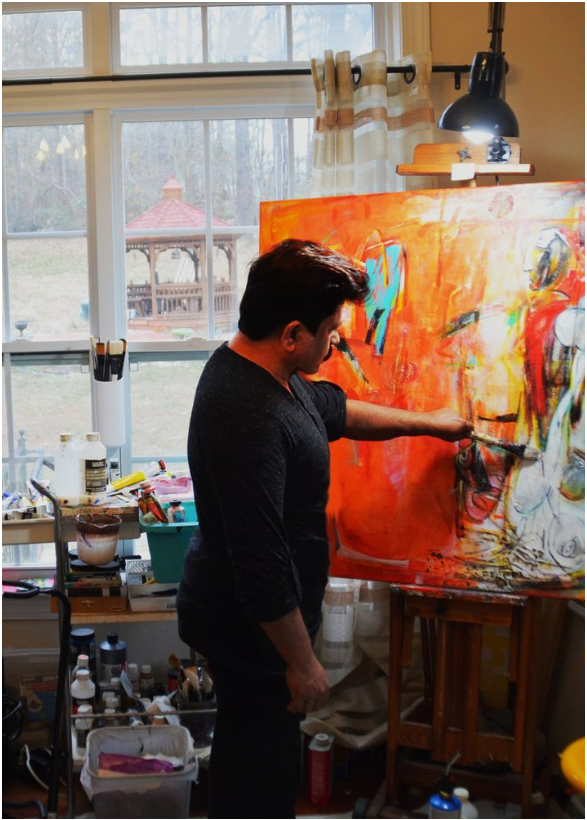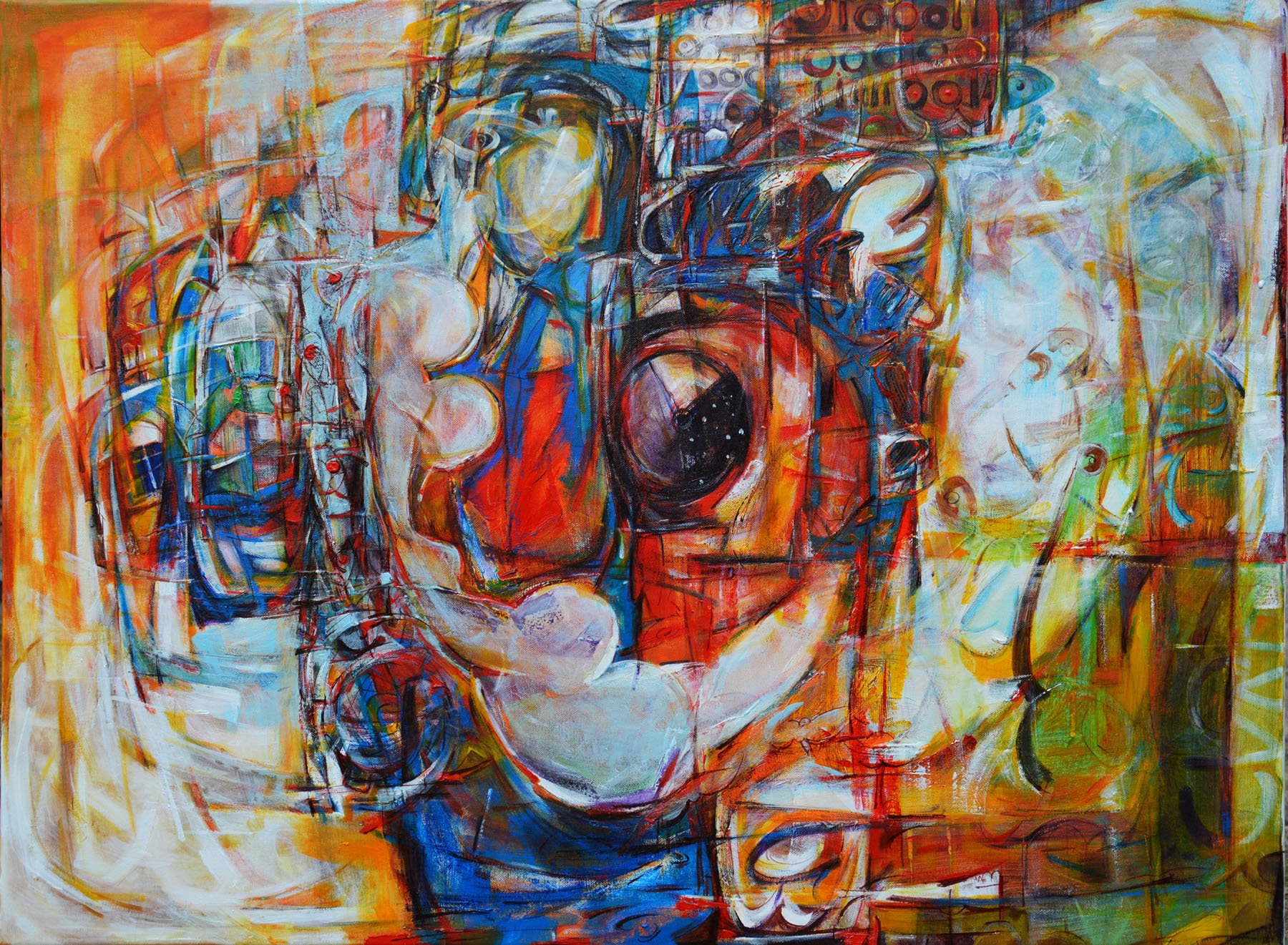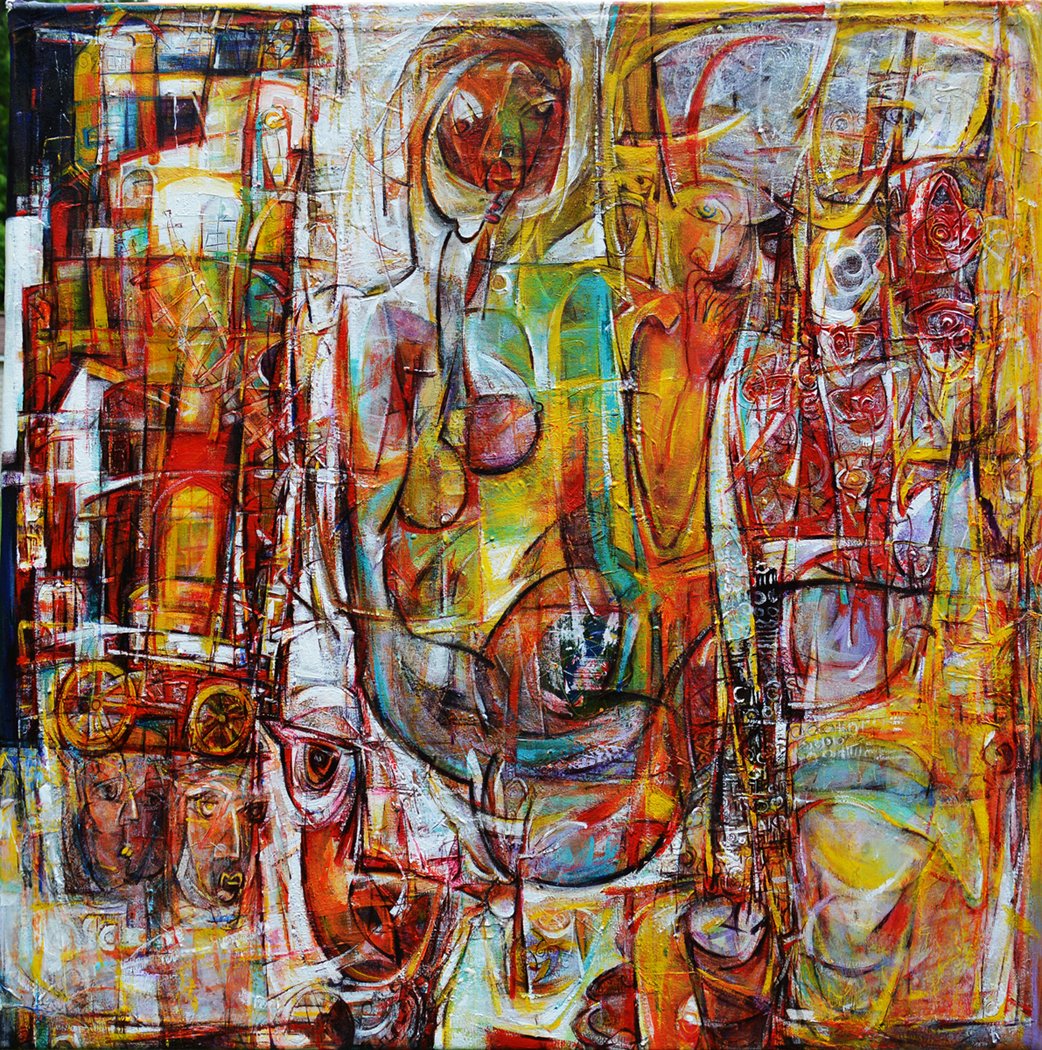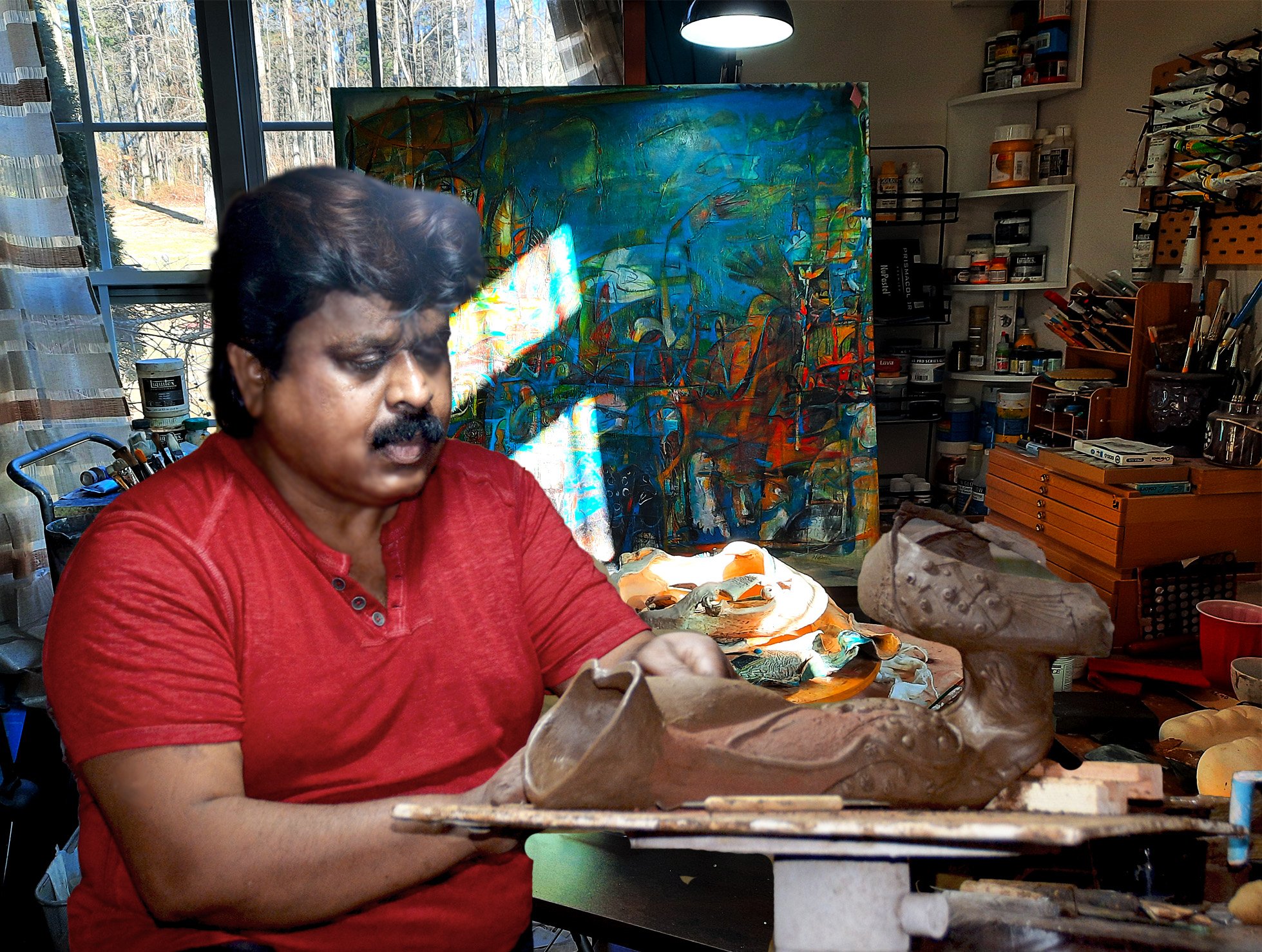10 Questions with Nipun Manda
Nipun Manda is an Asian American US citizen of Indian origin who had a regular urban life and is a BFA and MFA graduate. He continued his artistic career in various areas as a Visual arts educator and Cisco networking academy Instructor. He has curated and participated in various national and international shows, including the Florence Biennale, Italy, Art Expo New York, Affordable Art Fair, London, Paris art fair, Spectrum Miami Art Basel and World Art Dubai, Lalit Kala Academy, New Delhi, India.
His works have been represented by various Galleries and Art fairs, and he has successfully held extensive solo and group exhibitions nationally and internationally. His work is part of national and international collections and has been reviewed in publications in North America and other parts of the world.
Art has always been an important part of his life. His paintings incorporate globalization with their own multi-ethnic heritage, believing that paintings convey his rich experience. For Nipun, Art is a universal language that enhances the awareness, as well as the understanding of other cultures.
He currently resides and continues studio practice in Maryland, USA.
Nipun Manda - Portrait
ARTIST STATEMENT
“My work is a contemporary statement of my perception of Inner and outer space juxtaposing with the time and space of everyday life experiences incorporates into my creations visual, emotional and psychological impressions of urban tension. Among the raw emotions and harsh realities experienced there the scenario is tempered with gentle optimism and beauty. Living on a day-to-day basis, most of us are so caught up living in this world that we don't have much time or energy to focus on how the world might become better.
F or many probably most people, there reality of those choices are not usually acknowledged consciously, at least not on a daily basis. Such people rather, live according to habit, and exist mostly with in choices given to them. These are mainstream media and educational systems, economic necessity, and immediate need satisfaction. But, if we take time to reflect about it, we find that, in each given moment, we do have the ability to choose how we want to perceive the world, and how we want to live in it. We all have fundamental choices to make about who we are in the world, what the world means to us, and what kind of world we want to help create.
By creating art, the most satisfying way I find to paint is the combination of the abstract and the figure. The freedom of abstraction and the emotions that the figure can carry, with the symbolic potential of the objective world are endless. The possibilities that abstraction presents in suggesting the unknown is almost magical. My paintings operate and hover visually somewhere between abstraction and the cognitive world, between the unknown and the known. The works often begin with a general idea that might be reflecting on. My reactions to cultural and personal events of Inner and outer Spaces associated with our lives, thoughts, memories, and imaginations is paramount to the success of my paintings and sculptures. I translate these reactions into works made up of simplified forms, often with outsized proportions, to transcend time and space.
I try to paint what I believe in, eliminating any marks or images which feel disingenuous, listening to what the painting is telling me to do, rather than imposing my will on the work. In this way, it is my hope that the paintings aren’t driven self-consciously. They should emerge from a more enigmatic, less familiar place. In the process of painting, initiation, manipulation and removal of marks become one of the actions and reaction. The paintings emerge slowly, one on top of the other, until they tell me I am done.
It is hard to explain the how and the why. It is easy to make a formal analysis of the work and to position it in the great and diverse continuum of contemporary painting.
My goal is to leave cognitive space for viewers to fill in. I want my work to provide a chance to see things from different perspectives with the dimensions of the pieces viewers to become conscious of the physical relationship to the objects and scale proportion, and humanity to elicit an
emotional and intellectual response in my viewers.
Painting is a wondrous journey for me.”
— Nipun Manda
Nipun Manda in his studio
INTERVIEW
First of all, introduce yourself to our readers. Who are you, and how did you start experimenting with images?
My name is Nipun Kumar Manda, an Asian Indian American citizen who moved to the US to join my parents. I am a US-based contemporary abstract artist. After completing my master's degree in Fine Arts, I continued my deep-rooted passion for art as an artist and visual arts educator; on the other hand, I also worked as a Cisco Networking Academy certified lead Instructor teaching and preparing students for Industrial standards career path certification.
I've participated in group and solo exhibitions across the US and internationally, such as the Florence Biennial, Italy, Affordable art fair, London, Paris art show, art fair Dubai, Bermuda Art Center, Bermuda, and India, Queens Museum, NY, and also curated a couple of shows as mentioned above in this Interview. I currently live and actively work as an artist in my studio in Bowie, Maryland.
Since then, I have had a regular urban life. As a child, as early as two years old, I had always been imaginative and creative, a shy, quiet, introverted child who spent lots of time alone with my coloring books and toys. My mother cultivated my learning of shapes and colors by purchasing art supplies; since my childhood, I used to observe and draw nature, biomorphic shapes such as life and forms, and human figures; I always used to draw human anatomy dissections of plants and internal parts, slowly I developed my interest in art. Creating art has been one of the greatest joys in my life. Art was my favorite subject while at home on school breaks. I enjoy sketching.
My younger self was not commercially minded, and I didn't think ahead to how I would earn a living as an adult, but during my art studies, I got an opportunity to work with renewed artist professor Laxma Goud, creating intaglio, aquatint etchings, and textile designing.
Life's journey often takes unexpected turns, leading us to discover hidden passions and untapped potential. In my case, my path led to experience in two different cultures: east and west fusion. My love for the outdoors and a deep connection to nature. Exploring diverse cultures and ecosystems eventually blossomed into this connection to the natural world, which was an essential part of my identity and played a significant role in shaping my values and beliefs.
How would you define yourself as an artist?
I consider myself a multidisciplinary mixed-media artist. I have come a long way in thinking and experimenting with different media and different styles, starting from figurative to abstract. I do only semi-abstract style and get known for that style so that my work is instantly recognizable. I am an eclectic person with diverse interests, so my paintings and sculptures reflect that. My subject matter is nature and humankind, but sometimes I try to push the boundaries of the subject matter of what I normally paint. I am always trying to experiment with new mediums and new ways of layering paint or charcoal drawings with different pigments with different techniques bringing them into harmony.
Being an artist is a very challenging task, especially when it comes to creativity and participating in solo or group shows; the art market is very competitive. So to reach those goals, I have to sacrifice a lot of things. I practice my art in my indoor studio and outdoor studio, which is in my backyard, creating three-dimensional ceramic sculptures.
I firmly believe that artists need to push their boundaries from their comfort zone.
Falling into infinity, Mixed Media Acrylic on Canvas, 45x41 in © Nipun Manda
Can you tell us about the process of creating your work? What is your artistic routine when working?
I try to paint what I believe in, eliminating any marks or images that feel disingenuous, listening to what the painting is telling me to do, rather than imposing my will on the work. In this way, I hope that the paintings aren't driven self-consciously. They should emerge from a more enigmatic, less familiar place. In the process of painting, initiation, manipulation and removal of marks and textures become one of the actions and reactions. The paintings emerge slowly, one on top of the other, until they tell me I am done.
It is hard to explain the how and the why. It is easy to make a formal analysis of the work and to position it in the great and diverse continuum of contemporary painting.
My goal is to leave cognitive space for viewers to fill in. I want my work to provide a chance to see things from different perspectives with the dimensions of the pieces' viewers to become conscious of the physical relationship to the objects and scale proportion, and for humanity to elicit an emotional and intellectual response in my viewers.
As I mentioned earlier I am a mixed media artist, I also work with cold wax mixing with oil colors, acrylic, and charcoal or acrylic ink on canvas or board. My technique ranges from precise and detailed to freeing my expression.
In your artistic process, you mention the satisfaction you find in combining the abstract and the figure. Can you elaborate on how this combination allows you to explore the unknown and the known and why it is significant in conveying your artistic message?
I believe that there is a sense of unknown vibrating quietness connecting with the cosmos happening to our consciousness in this physical world, few things we don't see, but we feel it, with the changes in nature and mankind I express those actions and emotions in a nonrepresentational way in my painting juxtaposing with known there is some sought of power we carry that energy of connectivity to sustain our life with figurative elements. I also search for a subject that has a psychological meaning around ambiguity, mystery and complexity. I try to use the subject in whimsical composition and the application of brush strokes in a way to create energy, every brushstroke is a journey, sometimes we get lost if we don't, the end will always be the same bringing all the elements together in the overall composition, the potential motion, held in place by visual forces that work in opposite directions. I try to introduce this concept in my paintings; sometimes there is the perception of weight that pushes down against a rigid and centered composition that holds it in place, sometimes there is a simple perspective interrupted by unexpected and illogical overlapping elements, sometimes there is the lightness of the subject against the resolute brush strokes. As we live in a global village, humans are the anchors as part of this blue planet. A Symphony of Human Bonds and Nature is deeply moving and whimsically explores the profound depths of human relationships we are somehow all connected by known and unknown. So significantly, my process finds the combination of abstract and the figure in my composition.
Illumination, Mixed Media Acrylic on Canvas, 40x30 in © Nipun Manda
Intertwine, Mixed Media Acrylic on Canvas, 40x30 in © Nipun Manda
Your abstract paintings have vivid and striking colors. How do you choose your palette, and what does it represent for you?
Sure, my colors are vivid and striking, charged with energy; as we know, we are in the information age this world has become so complex in every aspect. If we step back and think ourselves where we are standing and how this world has become imbalance, when my viewers are looking at my painting my colors represents emotional feeling that words cannot replicate. Each color represents a positive meaning that can elicit a different reaction and emotion, depending on who the viewer is and where they are from.
I chose my color palette based on the theme by thinking of converging elements by scumbling to create a visual depth, if you see the elements of color in the overall composition, blue represents a feeling of calmness or serenity, also our blue planet. On the other hand, red is a sense of excitement or passion. Yellow and orange symbolize happiness, enlightenment, joy, positivity, fascination, stimulation and so on.
Whisper, Stoneware Relief Sculpture, 15x15x5 in © Nipun Manda
Your paintings often begin with a general idea reflecting on cultural and personal events of inner and outer spaces, as you discuss in your statement.
First, I am a strong believer in a universal force that vibrates throughout and holds everything together. I have experienced East and Western cultures and feel the shift of two different cultures if we think about how Globalization speeds up movements and exchanges of human beings, capital, technologies, or cultural practices and increased interactions between different regions become so complex around the globe.
So globally everywhere living on a day-to-day basis most of us are so caught up living in this world that we don't have much time or energy to focus on how the world might become better.
For many, probably most people, the reality of those choices is not usually acknowledged consciously, at least not daily. Such people, rather, live according to their cultural habits, and exist mostly within choices given to them and immediate need for satisfaction. But, if we take time to reflect about it, we find that, in each given moment, we do have the ability to choose how we want to perceive the world, and how we want to live in it. We all have fundamental choices to make about who we are in the world, what the world means to us, and what kind of world we want to help create. So these kinds of thoughts circulate in my inner self emotionally connected with the outer physical space and transform into visual language.
Whimsical Journey, Mixed Media Acrylic on Canvas, 48x36 in © Nipun Manda
Can you share an example of how a specific event or thought has inspired one of your works and how you translate these reactions into simplified forms?
In one of my pieces "The Whimsical Journey" I sought to depict the balance between the harmonious flow of energy and the unseen threads of connections, although we think of ourselves as individuals, separate from one another, we are all connected through an intricate web of energetic threads of network of human to human, human to nature forces of intellectual and emotional connection.
A Symphony of Human Bonds and Nature is deeply moving and whimsically explores the profound depths of human relationships with the vibration of universal forces.
The overall composition is whimsical in the canvas space, with the combination of abstract and figure encapsulating the multifaceted nature of our bonds with each other, the freedom of abstraction, and the emotions that the figure can carry, with the symbolic potential of the objective world are endless. The possibilities that abstraction presents in suggesting the unknown are almost magical. My paintings operate and hover visually and connect between semi abstraction between the known and unknown. The artwork delves into the intricate emotions and experiences that shape our connections, showcasing the beauty, complexity, and sometimes the fragility of our relationships.
This piece melds with mixed media of acrylic, organic terracotta dust with charcoal and acrylic inks, whimsical lines, and refined textures into a compelling visual narrative that resonates deeply with viewers and sparks introspection by seeing things from their perspective.
The color palette is a balanced fusion of warm, nurturing hues - rich reds, luminous yellows, and embracing oranges, harmoniously counterbalanced by warm and cool, soothing blues, tranquil greens, and soft grays. This spectrum of colors is thoughtfully curated to evoke a broad range of emotions, fostering, compassion, and understanding.
My goal is to leave cognitive and physical space as part of our blue planet for viewers to fill in. I want my work to provide a chance to see things from different perspectives and connect humanity to elicit emotional and intellectual responses in my viewers.
Your goal is to leave cognitive space for viewers to fill in and to provide a chance for them to see things from different perspectives. How do you achieve this, and what kind of emotional or intellectual response do you hope your viewers experience when engaging with your work?
I would like my works to lead the viewer to a place of timelessness and find the balance of a harmonious flow of energy connecting with the cyclical pattern of life. I achieved this socio and psychological thinking by observing the universal forces human bodies and minds are anchors to the physical world, negotiating our surroundings through action and reaction, adapting to seeing things from a different perspective, and engaging with the physical space in the overall composition of the painting and exploring the ever-evolving dialogue between art and the humanity and the harmonious flow of energy connecting with body and mind. Words cannot express the feelings of colors, textures, techniques, materials, and composition, the visual perception has to speak by itself connecting their personal emotional and intellectual experiences and carrying a dialog further. Every viewer reflects differently in their journey of life.
Transcendence, Mixed Media Acrylic on Canvas, 38x38 in © Nipun Manda
What do you think about the art community and market? And how did your perception change over time?
I am always willing to meet new people and I also cherish the connections I already have. I am so fortunate to meet great artists who work on different kinds of mediums and themes, and they always inspire me and support me. I have great artist connections and a great artistic community, which I appreciate most.
They sometimes ask me to show my art in their studios or let me know about new opportunities. As an artist, it is important to be involved in the artist community, keep in touch, and support others.
The art market is challenging to run through the gatekeepers your art must speak to that level. Historically speaking, some of the most significant art transactions have taken place outside the framework of what is now understood as an art market. The most common of these transactions involved the artist or craftsman and patrons who might be either a private individual or organizations. As I live in the US there are so many opportunities for artists and the art world community showcasing their works in Galleries and art fairs. The United States has been firmly holding its role as the global leading art market since the 1960s, with New York acting as the most important hub for domestic and international transactions. When I participated in art fairs in the US, I have seen so many international galleries merging into one platform.
On the other hand, Social media has created opportunities for Artists and Art enthusiasts to connect. With such a competitive market, artists are becoming more and more sophisticated with tools applied and inspirations gained. Social media has made it possible for a lot of Artists to get the much-needed recognition. Despite the good pacing and opportunities that have opened and keep opening up, I believe we still have a long way to go.
As I mentioned in this Interview my perception has changed throughout participating in art shows nationally and internationally connecting with artists, collectors, and galleries. I got inspired and motivated and then started creating more works in my studio. I am getting ready for upcoming Gallery shows and the UMBC Biennial show also will be Participating in Linkong Museum Show 2024.
What are you working on now, and what are your plans for the future? Anything exciting you can tell us about?
Currently, I am working on some multidisciplinary projects involving Ceramic sculptures and mixed media paintings on canvas and board; during this time my mind shifts simultaneously between 2-dimensional and 3-dimensional creations. It's very challenging that when I think creatively about the shapes, colors, themes, and materials, it all has to come together in an organized and compositional manner. One of them involves the use of stoneware free-standing sculptures and layering the glazes with different techniques that go into the kiln for cone firing.
Another project I have been working on is mixed media cold wax paintings. For this project as well I am drawing inspiration from my regular practice. I plan to exhibit both projects for my upcoming shows that I hope to have this year and next year in the UK and US.
Studio photo © Nipun Manda
Finally, what is one piece of advice you would give to an emerging artist?
First of all, educate yourself. Be proficient in your art and gain as much knowledge on techniques to find your language. Second, surrender your ego, listen to your higher self, and let your intuition guide you in a positive direction. Thirdly, don't sell out and go against your inherent creative nature, integrity is a must and be true to yourself, allow constructive criticism in, and block negativity. Making art is self-fulfilling and unilateral, so do what you want to do and make art that you want to see. Love the process in the studio and out, the people you encounter, the other artists, the events, the workshops, the books, the exhibitions they are all part of it.
Lastly, mastering foundations such as drawing and painting are important. If you have a strong foundation in the visual arts, you can build on your skills and make more advanced work any way you want. It comes so much easier. Hard work always pays off, I spent so many years gaining skills and experiences that I'll never regret. Selling matters, so invest time and energy in it. Build relationships with people who love your work or who may grow to love it as you evolve.
I would say, "Enjoy your journey as an artist."
Artist’s Talk
Al-Tiba9 Interviews is a promotional platform for artists to articulate their vision and engage them with our diverse readership through a published art dialogue. The artists are interviewed by Mohamed Benhadj, the founder & curator of Al-Tiba9, to highlight their artistic careers and introduce them to the international contemporary art scene across our vast network of museums, galleries, art professionals, art dealers, collectors, and art lovers across the globe.
























